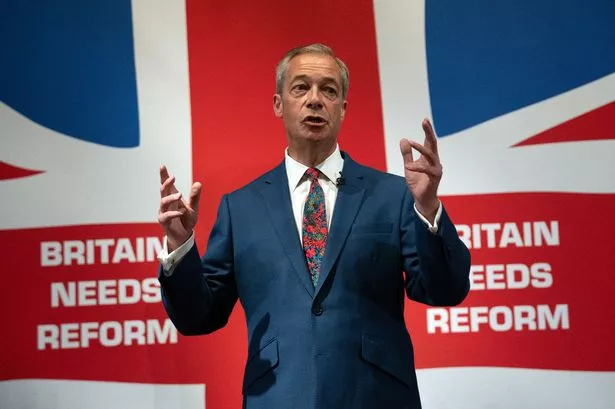Reform UK: Can Farage's Party Deliver Real Change?

Table of Contents
Reform UK's Core Policies and Platform
Reform UK's platform is built on several key pillars, each reflecting its distinctive ideological stance. Understanding these policies is crucial to assessing the party's potential impact.
Brexit and Sovereignty
Brexit remains the cornerstone of Reform UK's ideology. The party advocates for a complete departure from the European Union's influence, going beyond the initial withdrawal agreement. This includes:
- Renegotiating trade deals: Reform UK seeks to establish independent trade agreements with countries around the world, free from EU regulations. This could potentially boost certain sectors but might also lead to disruptions in others.
- Leaving the European Court of Human Rights: A key policy is to withdraw from the ECHR, asserting complete national sovereignty over legal matters. This controversial stance raises questions about human rights protections and international relations.
- Ending EU regulations: The party aims to repeal all remaining EU laws and regulations, a significant undertaking with potential economic and social consequences.
These Brexit-related policies are central to Reform UK's identity and attract voters who feel the initial Brexit process was insufficient. The potential economic impacts, however, remain a subject of ongoing debate.
Economic Policies
Reform UK promotes a generally free-market approach to the economy, emphasizing lower taxes and deregulation. Specific policies include:
- Significant tax cuts: The party proposes substantial reductions in income tax, corporation tax, and potentially other taxes. This aims to stimulate economic growth but could also affect public services funding.
- Deregulation: Reform UK advocates for reducing bureaucratic burdens on businesses, believing this will foster entrepreneurship and job creation. However, this could potentially lead to weaker consumer protections or environmental regulations.
- Focus on small businesses: The party prioritizes support for small and medium-sized enterprises (SMEs), considering them the engine of economic growth. This includes potential tax breaks and reduced regulations targeted specifically at SMEs.
The economic viability and potential social consequences of these policies are central points of contention in the ongoing political debate surrounding Reform UK.
Social and Cultural Policies
Reform UK's social and cultural policies are often characterized by a more conservative stance, although specific positions vary. Key areas include:
- Immigration control: The party advocates for stricter immigration controls, prioritizing skilled migration and limiting overall immigration numbers. The party's specific proposals on immigration are a frequent subject of public discussion and debate.
- Healthcare reform: While specific proposals vary, Reform UK generally expresses concerns about the sustainability of the National Health Service (NHS) and proposes reforms for increased efficiency. Details of these reforms and their potential impact are still developing.
- Education reform: Similar to healthcare, Reform UK seeks to reform the education system, focusing on improved standards and potentially increasing parental choice.
These social and cultural policies often generate significant debate, showcasing the party’s divergence from the mainstream political consensus.
Electoral Performance and Public Opinion
Understanding Reform UK's electoral success and public perception is crucial to analyzing its potential for future influence.
Past Election Results
Reform UK has experienced a mixed bag in recent elections. While initially gaining considerable traction with the public's discontent with mainstream parties, their electoral success has been limited in general elections.
- Local Elections: Reform UK has seen some successes in local elections, particularly in areas with strong Leave-voting populations in the 2016 EU referendum. However, this success hasn't consistently translated into national-level gains.
- European Parliament Elections: The party's initial successes were more prominent in European Parliament elections, where they secured several seats. This demonstrates their appeal to a segment of the electorate dissatisfied with established parties.
- General Elections: Their performance in general elections, however, has been considerably more modest, highlighting the challenges of transitioning from Eurosceptic appeal to broader national political support.
Visual representations of these election results, including charts and graphs, would provide a clearer picture of Reform UK's electoral trajectory.
Public Perception and Support
Public opinion polls regarding Reform UK reveal a complex picture.
- Strong core support: While national support remains limited, the party enjoys strong support within a specific demographic group—generally, those who strongly favor Brexit and are dissatisfied with the current political landscape.
- Negative perceptions: A significant portion of the public holds negative perceptions of Reform UK, often linked to its controversial policies and its association with Nigel Farage's previous political ventures. This negative perception acts as a major barrier to broader public acceptance.
- Demographic breakdown: Understanding the demographic breakdown of Reform UK's support is crucial. This may reveal specific policy areas appealing to particular groups and helps predict electoral strategies and potential future support.
Challenges Facing Reform UK
Despite its strong rhetoric, Reform UK faces significant challenges in achieving its goals.
Internal Divisions and Leadership
Internal conflicts and leadership challenges pose a threat to Reform UK's stability.
- Leadership transitions: The party has seen some leadership changes, potentially impacting its overall cohesion and strategic direction. The impact of these changes on party unity and electoral success is yet to be fully understood.
- Policy disagreements: Differences in opinion amongst party members regarding specific policies can cause internal disputes, potentially weakening the party's overall message. Such disagreements can become public, undermining the party's image of unity.
Competition from Other Parties
Reform UK faces stiff competition from other parties, especially those on the right of the political spectrum.
- Overlap with Conservative Party: In some policy areas, Reform UK's positions overlap with the Conservative Party, potentially making it difficult to attract voters who might already support the Conservatives. This requires Reform UK to clearly differentiate its positions from those of its rivals.
- Competition from other populist parties: The emergence of other populist parties further fragments the electorate, potentially limiting Reform UK's ability to gather a substantial share of votes. This competitive landscape forces Reform UK to fight for its place within a crowded political field.
Public Trust and Credibility
Gaining public trust and overcoming negative perceptions is a significant hurdle for Reform UK.
- Controversial statements: Past controversial statements by party members have damaged public trust and credibility. Addressing these controversies and rebuilding trust is essential for long-term success.
- Lack of experience: Compared to established parties, Reform UK's lack of governing experience could be seen as a drawback by voters. Demonstrating their competence and providing credible solutions to voters' concerns is paramount.
Conclusion
Reform UK presents a distinctive alternative in the British political landscape, offering a bold vision centered on Brexit and populist ideals. While its appeal to a segment of the population is undeniable, significant challenges remain, including internal divisions, negative public perceptions, and competition from established parties. Whether Reform UK can translate its populist appeal into meaningful political influence and deliver on its promises remains to be seen. Further monitoring of its electoral performance and public opinion will be crucial in assessing its long-term viability and its impact on the UK’s political landscape. To stay informed about Reform UK's activities and policies, visit their official website and engage in informed discussions about the future of British politics and the role of Reform UK within it.

Featured Posts
-
 How Middle Managers Drive Company Growth And Employee Engagement
May 10, 2025
How Middle Managers Drive Company Growth And Employee Engagement
May 10, 2025 -
 Strands Nyt Game 403 Solutions Thursday April 10th
May 10, 2025
Strands Nyt Game 403 Solutions Thursday April 10th
May 10, 2025 -
 The Us Attorney General And Fox News Understanding The Daily Appearances
May 10, 2025
The Us Attorney General And Fox News Understanding The Daily Appearances
May 10, 2025 -
 Ai In The Public Sector Palantirs New Nato Deal And Its Implications
May 10, 2025
Ai In The Public Sector Palantirs New Nato Deal And Its Implications
May 10, 2025 -
 Trumps Transgender Military Ban Fact Vs Fiction
May 10, 2025
Trumps Transgender Military Ban Fact Vs Fiction
May 10, 2025
